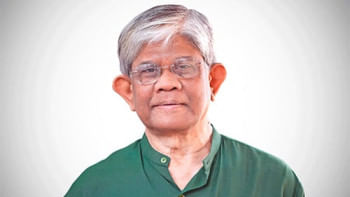‘Prosecuting Assange will have a devastating impact on press freedom’

Stefania Maurizi is an investigative journalist working for the Italian daily Il Fatto Quotidiano. She has worked on all WikiLeaks releases of secret documents and partnered with Glenn Greenwald to expose the Snowden Files about Italy. She has authored three books—'Dossier WikiLeaks: Segreti Italiani', 'Una Bomba, Dieci Storie' and "Il Potere Segreto. Perché vogliono distruggere Julian Assange e WikiLeaks." In an exclusive (electronic) interview with Eresh Omar Jamal of The Daily Star, she talks about the recent UK court ruling to overturn a decision not to extradite Julian Assange, the founder of WikiLeaks, to the US, to face espionage charges.
On December 10, a UK court overturned a decision not to extradite Julian Assange, the founder of WikiLeaks, to the US. On what basis did the court make this decision?
The Julian Assange and WikiLeaks case is, without exaggeration, the most important case on press freedom in a century. From Amnesty International to Human Rights Watch, from the American Civil Liberties Union (ACLU) to the International Federation of Journalists (IFJ) and Reporters Without Borders (RSF)—all the important organisations have condemned the prosecution of Julian Assange, denouncing its devastating impact on journalism and on the public's right to know.
However, the British justice system has completely rejected the press freedom arguments, to the extent that, till date, the whole extradition case revolves around the physical and mental conditions of Julian Assange. The US extradition request was initially rejected by District Judge Vanessa Baraitser, exclusively on the grounds that it would be oppressive to send him to the US because he is at serious risk of suicide. The British High Court of Justice did not reject this risk, but quite the opposite; the US tried to argue that "the judge erred in her overall assessment of the evidence going to the risk of suicide," but the High Court rejected this ground of appeal. However, it accepted the "diplomatic assurances" given by the US authorities that he would not be held in total isolation, under the so-called Special Administrative Measures (SAMs), and would not be incarcerated in the most extreme US prison, ADX Florence—unless he commits any future act that would require such extremely harsh measures—which will reduce his suicide risk, hence the WikiLeaks founder can be extradited. Amnesty has publicly stated that those assurances are completely unreliable.
Was the court's decision justified, given that the CIA had made secret plans to assassinate or illegally extradite Assange while he was in the Ecuadorian embassy in London, going so far as to risk a "gunfight" in the streets of London?
The British justice system has never cared about the destruction of Julian Assange—it has actively and relentlessly pursued it. The Crown Prosecution Service greatly contributed to creating the legal and diplomatic quagmire that kept Julian Assange arbitrarily detained from 2010 to 2019. It was completely indifferent to the impact of this arbitrary detention on Assange's health. And the Crown Prosecution Service is now assisting the US authorities in extraditing him to a country that wants to bury him in prison for life for doing journalism—revealing extraordinarily important information in the public interest.
The British courts have completely ignored the decision of the UN Working Group on Arbitrary Detention, which called for Assange to be released and compensated. They have completely ignored the UN special rapporteur on torture, Nils Melzer, who established that the WikiLeaks founder had been psychologically tortured. As the great British director Ken Loach wrote in his preface to my Italian book, 'Il Potere Segreto. Perché vogliono distruggere Julian Assange e WikiLeaks, which will be available in English next year, this case is a "monstrous injustice." The British High Court has simply followed that path, ruling that he can be extradited to a country whose intelligence agencies planned to assassinate him.
Assange has recently had what has been described as a mini stroke while in Belmarsh prison. UN Special Rapporteur Nils Melzer said that the US was trying to kill Assange by forcing him to stay in detention. What are your thoughts on this situation?
I completely agree with Nils Melzer that the UK is literally torturing him to death. People might think that this is an exaggeration, because the British authorities don't waterboard him and they don't burn cigarettes on his arms. But the point is that there is no need for cigarette burns on Julian Assange's arms when you can bring him to the brink of suicide, through nine years of arbitrary detention, without even an hour a day outdoors and no way out.
With my newspaper—initially the leading Italian newsmagazine l'Espresso and the Italian daily La Repubblica, and today the major Italian daily Il Fatto Quotidiano—I have worked on the WikiLeaks secret documents since 2009. I have known Julian Assange for over a decade, witnessing the hell he has gone through, while the media laughed at him for saying the US was after him and other WikiLeaks journalists for publishing the secret documents on the Afghan and Iraq wars, the US diplomacy cables and the Guantanamo files. Every morning, I wake up terrified that he may have committed suicide or may have died in prison. It's very obvious that the American and British authorities want to break him, and they are succeeding: his physical and mental health is seriously impaired.
Why is the US government so desperate to kill or get their hands on Assange? Out of all the journalists in the world, what is so special about him in their eyes?
The US authorities want him and the WikiLeaks journalists in prison for life because they did not just expose their dirty secrets; they made billions of people realise that the war against secrecy—when secrecy is not used to protect citizens, but rather to cover up state criminality at the highest level—can be won. That is a devastating prospect for the US authorities, and actually for the US's enemies as well. Russia, China, North Korea, and Iran may have been very happy to see how WikiLeaks exposed US war crimes, torture, and extrajudicial killings by drones; they may have been happy when WikiLeaks embarrassed the US. But at the same time, they fear that, sooner or later, it might happen to them as well. They could be the next to have their dirty secrets exposed.
In the digital world, it's very difficult to control secrets. The fact that in less than a decade, the Pentagon, the Department of State, the CIA and the NSA lost control of their dirty secrets demonstrates how vulnerable they are. And so the US, its allies and its enemies need a tragic ending: they need to show anyone who dares to do what Julian Assange and WikiLeaks have done that the consequences of such actions are devastating. They have to build a powerful deterrent to terrify everyone, which is what they are doing to Julian Assange. Whereas we journalists, intellectuals, artists want the exact opposite: we want to build a world in which journalists and whistleblowers can reveal war crimes and torture, and be safe and free afterwards. We want to build a world where the highest levels of power are accountable, and are not above the law.
Daniel Ellsberg, who released the Pentagon Papers, said that this was the single most important press-related case in history. Why, then, don't we see more mention of it in the international press? Shouldn't there be outrage, given the legal precedent it would set for journalists around the world?
I think that in the last two years, many things have changed and we are now seeing a mobilisation in support of Julian Assange and the WikiLeaks journalists. All the press giants are running editorials opposing his extradition; the biggest journalistic unions are opposing it; artists and intellectuals are speaking out. I will not forget the media's role in crushing Julian Assange and the WikiLeaks journalists—thereby making a long demonisation campaign against him possible—but the brutal arrest of Assange and the charges against him have made media people realise how devastating this case is for press freedom globally. We need even more: we need a mass mobilisation, millions from London to New York, from Dhaka to Rome, taking to the streets to ask for the US to drop the charges and the investigation into the WikiLeaks journalists. Only mass mobilisation can save them—British and American justice systems won't save them. The British and American justice systems keep protecting the war criminals and the torturers—that is who they are—whereas we want a world where the war criminals go to prison and the journalists are free and safe.

 For all latest news, follow The Daily Star's Google News channel.
For all latest news, follow The Daily Star's Google News channel. 



Comments